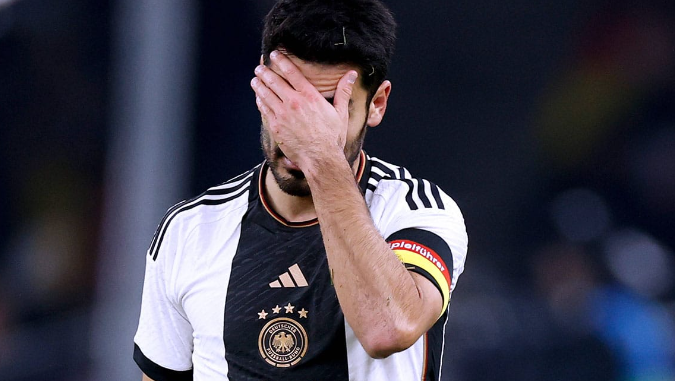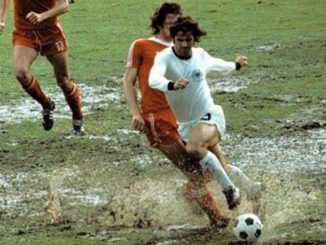
The Qatar World Cup campaign in 2022 was a low point for the German national team, but unfortunately 2023 was going to get a lot worse for them with coach Hansi Flick ultimately paying the price for failure with his job. The past year has been one to forget, and the hope is that things cannot get worse and have to improve as the nation prepares to host the European Championships in the summer.
Germany didn’t travel to Qatar in the winter of 2022 as one of the World Cup favourites, but they certainly weren’t predicted to exit at the group stage for the second successive tournament. Bundestrainer Hansi Flick was given a second chance to rectify things in the New Year, but 2023 just turned into an ‘Annus Horribilis’ for the German national team.
With no European qualifiers to play as hosts of the 2024 finals, Germany faced a series of friendlies in order to prepare themselves and build some momentum for the first tournament on home soil since the World Cup in 2006. However a record of just three wins, two draws and six defeats in their eleven fixtures meant the situation lurched from bad to awful in the space of 12 months.
Hansi Flick’s dirty half dozen
The year got off to a winning start when Niclas Füllkrug kept up his impressive record at international level with two goals to beat a largely harmless Peru in Mainz. However, three days later in Köln Belgium made up for their own disappointing World cup with a 3-2 victory over the Germans. Two goals inside the opening nine minutes put the visitors in control and an improvement in the second 45 minutes came too late to turn things around.
The three friendlies arranged in June on paper had three wins pencilled in, but in the end they only just scraped a draw with Ukraine and lost to both Poland and Colombia. The Germans were actually not bad against the Poles, but were just lacking in the final third, but against the South Americans they were toothless and were punished for defensive lapses.
The first match of the Autumn provided the opportunity to gain revenge over Japan for the shock defeat suffered at the World Cup. The Samurais however inflicted an even heavier defeat on Germany at the Volkswagen Arena in Wolfsburg with a 4-1 trouncing of a hapless Mannschaft. The embarrassing loss spelt the end of the road for Bundestrainer Hansi Flick with the DFB sacking their coach for the first-time ever.
Rudi Völler stepped in to oversee the next match against World Cup runners-up France and got the traditional upswing in fortunes that a change of coach usually produces. Germany emerged 2-1 winners from the clash in Dortmund with a goal at the start from the recalled Thomas Müller and one at the end for the impressive Leroy Sané.
No magic wand for Nagelsmann
With Völler making it clear he wasn’t the man for the longer-term, the surprise choice to succeed Hansi Flick was former Bayern Munich and RB Leipzig coach Julian Nagelsmann (at the age of 36). His first matches at the helm saw him accompany the team on a bizarrely arranged tour to the United States. The wisdom of taking the players across the Atlantic in the middle of the season was baffling and not universally popular amongst the squad. The USA were beaten 3-1 in Hartford, but the subsequent game against Mexico four days later saw them draw 2-2 in Philadelphia.
It was back on European soil for two matches in November to end the year, but it was not to be a happy ending. An early goal from Kai Havertz was the ideal start against Turkey in Berlin’s Olympiastadion, Germany were behind at half-time. Niclas Füllkrug bagged an equaliser, only for a VAR awarded penalty to ultimately condemn the hosts to another defeat in Nagelsmann’s premier on home soil. A short trip to Vienna ended the year but goals from Bundesliga stars Marcel Sabitzer and Christoph Baumgartner combined with a red card for Leroy Sané meant that there was no end of year cheer for Nagelsmann and the Nationalmannschaft.
Things can only get better (surely?)
So 2023 was a year to forget for the German team, but can they hope for any better in 2024? Julian Nagelsmann has a decision to make as to how much he changes the squad going into the Euros. Does he stick with the usual suspects, who underperformed so badly in 2023 in the hope that their class eventually shines through, or does he bring in some fresh, hungry talent with the hope of a rebirth?
Germany have been drawn alongside Scotland, Hungary and Switzerland in the European Championships group stage, so there are three potential banana skins. They have pre-tournament friendlies against both France and the Netherlands in March, which will serve as a barometer for the state the squad is in.
After a poor World Cup and an abject 2023, the question as to what would denote success at the Euros is an interesting one. The watching public will want to see the Nationalmannschaft triumph on home soil for the first time since 1974, but the realists among them will look back over the past year and have less ambitious targets.
It surely has to get better. Could it get any worse?



